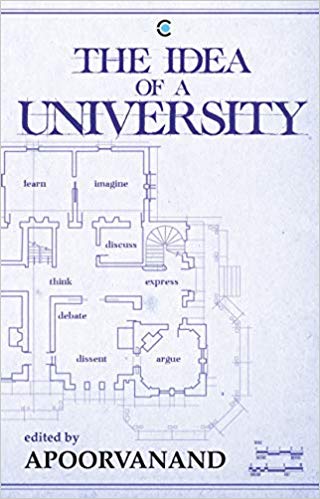The Idea of a University, edited by Apoorvanand, is a spirited defence of ‘cosmopolitan’, liberal university education and reassertion of the meaning and relevance of academic freedom in today’s troubling times. Notably, this book draws on the same title as John Henry Newman’s 1852 volume, which was a collection of his lectures on the idea of an ideal university, (that was published in the backdrop of the first Irish Catholic University, the University of Dublin, being set up). The editor does not acknowledge this apparent connection in the Introduction. However, it is evident from the collection of essays that by tracing a detailed story of Indian universities the current volume seeks to assert, as did Newman, that a university is a space of free discussion, debate and learning for the youth.
The Introduction highlights the multiple freedoms and avenues of social mobility that a public university has come to provide, and how this very character of the university in India is under attack as the current dispensation is forcing universities to ‘redefine their role, prove their utility, shed their elitism and account for the money being spent on them…[and] prove their nationalist credentials…’ (pp. 4-11). Identifying the recent onslaught on Jawaharlal Nehru University and Hyderabad Central University as a reaction to the egalitarian culture and social mobility offered by such public universities, the editor also pinpoints the larger attack on university education in the form of ‘desertification of Indian colleges and universities’ i.e., fund cuts, faculty positions being kept vacant, etc. (p.7). Nevertheless, these assertions aside, the Introduction for the large part reads more like musings rather than a cogent engagement with the eighteen essays.
There appears no particular logic to the ordering of the essays. The collection begins with an essay by Alok Rai, who asserts that the existential crisis faced by Indian universities today goes well beyond the problem of ‘malign neglect’ confronting universities in the West (p.13). Rai highlights the policy attack on universities in terms of ‘over-enrolment’, ‘under-funding’ and overt emphasis on so-called skilling (pp. 16-17). These subvert the university system and reduce the Indian university to an ‘educational wasteland’ (p.16). In this context, the handful of institutions that have managed to exist as ‘enclaves of excellence’ (p.18) are steadily falling prey to the onslaught by belligerent ‘nationalists’, whose jumlabaazi stems from the growing failure to fulfill promises of inclusive growth and development (p.19).The next essay by Shobhit Mahajan is a worried account of the growing presence of non-scientific epistemology and redirecting of funds for propagandist ‘non-conventional’ science—both, he claims, spell doom for genuine democracy. The third essay by Debaditya Bhattacharya is an insightful examination of recent policy shifts towards graded autonomy, NAAC ratings, NIRF rankings, and the push towards the constitution of a Higher Education Commission of India in place of the University Grants Commission. A noteworthy discussion follows on the authoritarian functioning of provincial central universities like Central University of South Bihar, and the bureaucratic surveillance on State universities that State governments have unleashed. Given the illiberal pulls engrained within the university system, Bhattacharya problematizes the tendency of equating autonomy with ‘academic freedom’, and argues that what we require is the freedom to constitute the university as a ‘space of parrhesia or intense truth-telling’(p.51).

